![]()
Summer 2012 | Middle East Quarterly, Volume XIX: Number 3, pp. 53-62 | by Ofra Bengio

The first modern Iraqi constitution was imposed by the British on the people of Mesopotamia as was its first modern king, Faisal I (center; T.E. Lawrence is behind him on the right). Neither really took, and Iraq’s first experiment with democracy ended in bloodshed.
In the wake of the upheavals that have shaken the Arab world since December 2010, activists, politicians, and analysts have all been searching for new, democratic models of governance that could come into force in these lands. The cases of Iraq and Turkey are perhaps the most obvious choices to examine based on the notion that these are the only examples of functioning democracies within Muslim-majority nations of the Middle East.
Hoping to turn post-Saddam Iraq into a model to be emulated by the Arab states, the Bush administration set out to create an Athens-on-the-Tigris complete with free elections and a constitution with separation of powers provisions. Although the Turkish model had a completely different genesis and evolution, it is worth exploring as Ankara has proclaimed itself a model for the post-revolutionary regimes. What lessons can be drawn from the Iraqi and Turkish experiences, and to what extent do they fit other Middle Eastern states?
The Iraqi Model
In the early decades of the twentieth century, the Western powers sought to graft onto the political systems of the newly-born Arab states the values of democracy, constitutionalism, and pluralism. As soon as Britain obtained the mandate for Iraq in 1920, it set out to build a democratic system very much resembling the British model itself. This included the establishment of a constitutional monarchy subordinate to a progressive constitution, the establishment of a parliament with upper and lower houses, and the launching of a nationwide system of elections. However, this edifice crumbled on the first day of Abd al-Karim Qassem’s July 1958 putsch, and it would take nearly fifty years, and a large scale foreign invasion of Iraq, before an attempt at its reconstitution would be made. What went so horribly wrong? And are the new circumstances more conducive to the success of the nascent Iraqi democracy?
The evident answer to the first question is that this construction was imposed artificially on a society that had different cultural, political, and social values and did not evolve from within the society itself. Even if Iraqis wished to have a Western-type constitution, they had no say in its promulgation. In the words of the British president of the Iraqi Court of First Instance, the constitution was a “gift from the West.”[1] Similarly, although there was a parliament in place, it did not function in a healthy or normal fashion: During its entire existence, the legislature never cast a single no-confidence vote against the cabinet, rubber-stamping its decisions while simultaneously suffering sporadic dissolutions.[2] While elections were held, they were rigged time and time again. In short there was a façade of democratic institutions but the ideas and practices never set down roots in society. With Qassem’s takeover and the murder of the entire royal family, the democratic project expired.
The idea of reviving the democratic project in Iraq began to gather momentum in 1998, once again spurred not by Iraqis themselves but by an outside superpower, the United States. Thus, according to the 1998 Iraq Liberation Act, “it should be the policy of the United States to support efforts to remove the regime headed by Saddam Hussein from power in Iraq and to promote the emergence of a democratic government in place of that regime.”[3]
In time, the moving spirit behind the project of Iraqi democratization came to be President George W. Bush who was, in a fashion, walking in the footsteps of his British predecessors. His declared goal was to help the downtrodden people of Iraq get rid of their oppressor and bring progress and democracy to the state. But in Bush’s case another more ambitious target was stated as well, namely turning the post-Saddam Iraqi democracy into a model for other Arab countries to follow. Thus, on the eve of the invasion he declared: “A free Iraq can be a source of hope for all the Middle East … instead of threatening its neighbors and harboring terrorists, Iraq can be an example of progress and prosperity in a region that needs both.”[4] On another occasion, he stated: “The nation of Iraq, with its proud heritage, abundant resources, and skilled and educated people, is fully capable of moving toward democracy and living in freedom.”[5]
But how has this democracy fared in Iraq itself? Can it serve as a model or “a source of hope” to other Arab countries?
Flaws in the Iraqi Model
Regrettably, the haste with which the framework of democracy was put together in post-Saddam Iraq is reminiscent of the earlier British experiment in the same country. This time, however, the constitution generated debates and disputes between different partners regarding such issues as the place of religion in the state or the role of women.[6] Overall, these controversies centered on what The Wall Street Journal described as “two very different visions of what the new Iraq should be: a nation that gives little political significance to ethnic and religious divisions, or one that weaves those divisions into the political fabric.”[7] And although Iraqis did have an important say in composing it, for many of them, the constitution and, for that matter, the democratic experiment as a whole looked like a U.S. diktat.[8]
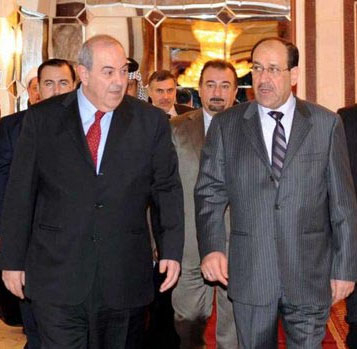
Iraq’s current experiment in constitutional government is off to a shaky and uncertain start. Despite Iyad Allawi (left) scoring the highest number of votes in the March 2010 elections, the candidate was compelled to hand the prime minister’s post to his chief rival, Nouri al-Maliki (right).
Unlike in the monarchical and Baathist eras, the Iraqi people did participate in three more or less free and democratic elections. However, while the framework of democratic institutions does exist, the spirit and contents are lacking. More often than not the parliament is paralyzed. It took an entire year to form a cabinet after the March 2010 elections because of incumbent Nouri al-Maliki’s reluctance to give up his post. Although the list headed by Iyad Allawi scored the highest number of votes in that election, Maliki’s maneuvering and shrewdness won him the prime ministry in the end.[9]
Civilian strife that flared up immediately after the U.S.-led invasion also threatened the entire Iraqi democratization project. The underlying cause for this conflict was that the minority Sunni community that had ruled Iraq since its creation was unwilling to accept the democratic norms that granted power to the erstwhile marginalized Shiite majority and the Kurds. In addition, the sudden change from an extremely totalitarian political system to an avowedly democratic one left the majority of Iraqis completely unprepared for such a transformation. Further, the freedom of expression and organization incorporated in the post-Saddam Iraq constitution gave rise to new Islamist forces, which believed more in God’s rule than in the rule of man. In the debates that anticipated the drafting of the constitution, these groups, headed by Grand Ayatollah Ali Sistani, demanded that Shari’a (Islamic law) be the source of legislation. It was not to be, however, because both Washington and the Kurds were against it.
Two sectors in particular fell victim to the expanding power of political Islam and the illiberal society developing in Iraq: women and minorities. As part of their efforts to construct a new Iraqi society, Washington and its allies placed special emphasis on the status of women, believing it would be impossible to establish democracy in a country that lacked equitable representation for women. Initially women did seem to be well represented in the echelons of power. However, as time went by, the increasing influence of Islamic groups further restricted their participation in the government. For example, by May 2006, only four out of thirty-nine cabinet ministers were women, none in important portfolios. In daily life, many women are harassed for not adhering to what is considered a proper Islamic dress code. Acts of violence, including killing, kidnapping, rape, and other forms of sexual harassment increased significantly in post-Saddam Iraq, so much so that some contend that women were better off under Saddam.[10] Iraqi women’s rights activists are, in turn, accused of trying to impose secularism and foreign values. Thus, women were once again “left outside state supervision, vulnerable to unfavorable interpretations of Islamic and customary laws.”[11]
The fate of minorities has fared no better. A 2007 field study reached the conclusion that Iraq’s Christian, Yezidi, and Mandean communities was under threat and that the majority of Christians had fled their homes with nearly half living abroad as refugees. The report emphasized that Christians and other religious and ethnic minorities were targeted for acts of violence and discrimination precisely because they were non-Muslim or Kurdish.[12] It is indeed ironic that under the watchful eyes of the U.S. military, the harassment of indigenous Christians and other religious minorities has reached its peak.[13]
For their part, the Kurds, since the establishment of the Kurdistan Regional Government (KRG) in 1992, sought to portray themselves as a model of democracy for Iraq and other countries in the region. They based their claim on the fact that there was no fratricidal infighting among them since the late 1990s; that elections in the region and the transformation of power from one government to another went smoothly; and that there was freedom of expression and organization. Indeed, though this democracy left much to be desired, it was still stronger than in the rest of Iraq. This was due to both the slower pace of developments in the region and the fact that the framework of democratic institutions was not imposed from the outside (though nongovernmental organizations played an important role in promoting the process). Islamist parties were also much weaker in Kurdistan than in the center of the country.
The eruption of the Arab upheavals at the end of 2010 rekindled the debate over the Iraqi democratization model both in the United States and the Arab world. There were those who considered these events as having been inspired by the Iraqi model and the promotion of democracy there. For instance, Condoleezza Rice, secretary of state under Bush, credited the administration for the Arab uprisings: “The demise of repressive governments in Tunisia, Egypt, and elsewhere … stemmed in part from Bush’s ‘freedom agenda,'” which “promoted democracy in the Middle East.”[14] Former vice president Dick Cheney stressed that “the fact that we brought democracy … and freedom to Iraq, has had a ripple effect on some of those other countries.”[15]
Others were more skeptical. Middle East specialist Fouad Ajami debunked what he termed the “myth” that the Arab upheavals were inspired by developments in Iraq, noting that when the protests began in late 2010, “there was bloodshed in Iraq’s streets; there was sectarianism, and few Arabs could consider Prime Minister Nouri al-Maliki a standard-bearer of a new political culture.” In his view, Saddam’s “despotism had been decapitated by American power, so it was not a homegrown liberation. And the new Iraqi order had empowered the Shiite majority.” In addition, the Sunni “Arab street was not enamored of the political change in Iraq; it had passionately opposed the American war and had no use for Baghdad’s new Shiite leaders.”[16]
The late Anthony Shadid of The New York Times was even more negative: “My own sense … is that the Iraq war — the invasion of 2003 and the aftermath — delayed the Arab Spring. I think you can make the argument that these revolts and uprisings that have swept the region may have even happened earlier had not this scar of that occupation not been left on the region.”[17]
The Iraqi model of democracy is a poor example to be emulated by other Arab states due to the civil strife that accompanied its birth, because it was viewed as an artificial Western diktat, and because it seemed to be lacking authenticity and staying power. There was, however, something to be learned from the Iraqi experience, namely that the ruler was not invincible and that the worst of dictatorships can be destroyed once the barrier of fear was overcome. In this sense, developments in post-Saddam Iraq did serve as a catalyst for the revolutions in the Arab countries even though they took some eight years to mature.
If Iraq has failed to serve as a democratic model, does Turkey offer a better example?
The Turkish Model
For many years, Turkey was considered an island of democracy in an otherwise autocratic Muslim world. Writing in 1994, Bernard Lewis attributed Turkey’s position as “the only Muslim democracy” to various historical, political, and socioeconomic factors: Turkey had never been occupied by a foreign power that attempted to impose Western democratic values upon it. Rather, democracy was nourished slowly and gradually within Turkish society itself. From the start, Ankara was Western-oriented, hence more adaptive to the democratic norms developed there. Though lacking oil, Turkey was able to develop a strong economy, which in turn enabled it to cultivate a civil society, an important pillar of democracy. Last, but certainly not least, in Turkey there was a separation between religion and state. Despite three interventions by the Turkish military between the 1960s and early 1990s, the generals handed power back to civilians after a brief period, indicating a commitment to democratic norms.[18]
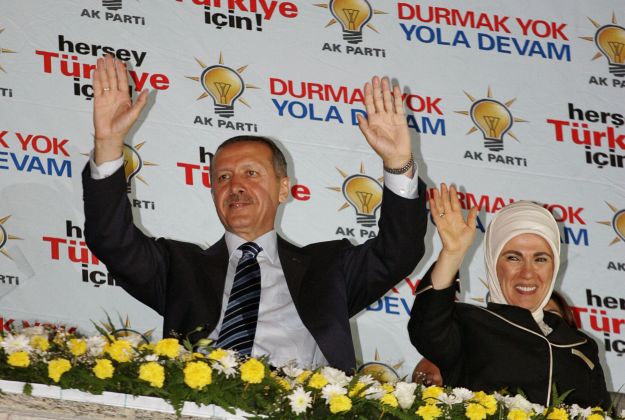
Turkish president Erdogan’s mixture of Islamism and democracy has been suggested by many as a possible model for the Arab world’s recent revolutions. (GALI TIBBON/AFP/Getty Images)
Almost two decades later, the picture in Turkey has changed dramatically. Since 2002, the ruling Islamist Justice and Development Party (AKP) has managed to marginalize the military in politics, and Ankara is no longer chiefly Western-oriented, having developed strong ties with the Muslim Arab Middle East as well. These transformations also meant that Ankara sought to serve as a model for the democratization of post-revolutionary Arab regimes, a role that held no attraction for it before a decade ago.
The Turkish leaders’ claims to such a role are based on the fact that Turkey is a Muslim-majority state; hence, they argue, Ankara is the best proof that Islam and democracy are compatible. Turkish economist Sinan Ülgen has suggested that the Turkish model is more appropriate for the Arab world “not so much because of what Turkey does but because of what it is.” He points to the cultural affinity between Ankara and the countries of the Middle East and North Africa, which “find Turkey’s own experience more meaningful and see it as more relevant and transposable than the similar experiences of non-Muslim nations.” He maintains that Turkey’s domestic transformation, brought about by the ruling AKP party with roots in political Islam, can only enhance the effectiveness of such cultural affinity.[19]
Ankara, furthermore, asserts that after detaching the military from the domestic political game in a peaceful manner, Turkey is an even stronger candidate for emulation by emerging Arab governments who are struggling with decades-long intervention by military-led regimes.[20] Similarly, the AKP contends that Turkey’s long experience with homegrown democracy can assist Arab societies in establishing their own democratic institutions in this period of transition.[21] It also has claimed that it has stood by the Arab revolutionaries in their difficult times, a further incentive for Arab states to follow in its footsteps.[22] Taha Özhan of the Washington-based Turkish think-tank SETA went so far as to suggest that Turkey’s policies and stance on various regional issues had an impact on the eruption of the Arab revolutions. He suggested that to “understand the impact of Turkey in the making of the Arab spring” one should consider that “Turkey … has been a success story for those countries suffering from a lack of democratization, economic development, and distribution of income, and despised and oppressed by Israel.”[23]
Two Turkish scholars, Nuh Yılmaz and Kadir Üstün have summed up Turkey’s vision thus: While “Turkey’s transformation from a staunchly secularist NATO ally under military tutelage to a democratic model did not occur overnight … Turkish democracy has matured, and Ankara feels confident enough to present itself as an inspiration to the Middle East.”[24] Ersat Hurmuzlu, an advisor to Turkish president Abdullah Gül, insists that “Turkey is not looking for a role but the role is looking for it.”[25]
The Turkish government took some practical and energetic moves to promote itself as a role model, inviting members of the opposition and new would-be political leaders to Istanbul to participate in conferences and seminars on the democratization project. For example, the Syrian opposition movement (including members of the Syrian Muslim Brotherhood) has held meetings in Turkey to prepare for a post-Assad regime in Syria. At the same time, Turkish universities, nongovernmental organizations, and research institutions have upgraded their relations with Arab countries while academic gatherings, common broadcasts, and forums have reached an unprecedented level.[26]
Seeking to derive the most from the current revolutionary momentum, Turkish prime minister Recep Tayyip Erdoğan set out in September 2011 on an “Arab Spring tour,” visiting the post-upheaval states of Egypt, Libya, and Tunisia. According to the Christian Science Monitor, the tour “has been a hit” as Erdoğan made his way across North Africa, “extolling Turkey as a democratic model for fellow Muslims who have cast off their dictators.”[27] In Libya, for example, prayer leader Salim al-Shaykhi told the crowd of several thousand in Tripoli’s Martyrs’ Square: “After we thank God, we thank our friend Mr. Erdoğan, and after him all the Turkish people.”[28] Özhan has written that “people who want to change towards a model based on Turkey enthusiastically welcomed Prime Minister Erdoğan, openly asking him to fill the political vacuum after the Arab revolutions.”[29]
Arab commentators have followed suit. Abd al-Bari Atwan stated that “the AKP has become a sort of guide for Islamist parties” which sought to imitate its economic achievements.[30] Others spoke about the admiration that these parties had for the Turkish model.[31] Syrian scholar Sadik al-Azm argued that by the time of the Arab upheavals, all the factions in those countries — leftists, nationalists, and Islamists, who for their own reasons had had a negative view of Turkey — came to regard “the Turkish model” as the best paradigm to be followed.[32]
Erdoğan was welcomed as a hero by crowds in these countries. But this enthusiastic welcome should not be interpreted as wholehearted support for the democratic model. For all the assertions — from Turkish and non-Turkish sources — there is clear evidence that Erdoğan’s popularity had to do with other causes, including his government’s Islamist tendencies, his confrontational stance on Israel, and Turkey’s economic achievements under the AKP.
The election of the Islamist AKP in 2002 was a watershed in the Arab world’s interest in Ankara and in its new, positive attitude toward Turkey. There seems to be a clear correlation between a more positive view about Turkey and changes in Turkish foreign policy, particularly with respect to the bilateral relationship with Israel and the Palestinian issue.[33] The most dramatic example came in the aftermath of the 2008-09 Israel-Hamas-Gaza confrontation. As Palestinian journalist Sameh Habeeb stated:
Turkish prime minister Erdoğan criticizing Israel and then leaving the meeting with Israeli president Shimon Peres was the turning point for Turkey in the Arab street … In a short span of time and in the hearts and minds of those within the Arab street and the global activist community, Erdoğan became a key player in the Middle East, especially in the absence of any real Arab leadership.[34]
Turkey’s vibrant economy may have also made it particularly attractive for reformers.[35] As one Turkish analyst suggested, “In sum, the AKP’s bottom-up connection with Islam, the economic dynamics that compelled Turkey to seek an active political and economic role in the region, and Turkey’s gradual transformation into a soft power have constituted the main pillars of the Turkish model.”[36]
Distrust of the Turkish Model
At the same time, skepticism about the Turkish model began to surface little by little. Sami Zubaida of the University of London took issue with Turkish democracy as a model for post-revolutionary Arab regimes and raised concerns regarding the fortune of Turkish democracy under the AKP, stating that “pluralism is now threatened by the repeated electoral successes of the AKP, establishing, in effect, the bases for a majoritarian authoritarianism, at both the institutional and the communal levels.”[37] Abdel Moneim Said, chairman of the board of al-Ahram Weekly, a government mouthpiece, admitted to admiring Erdoğan and his achievements but declared that Egypt had
no need for the caliphate. … Historically, Egypt had always offered a model of its own, to which testifies the birth of the modern Egyptian state in 1922 … maybe we will summon the courage to return to our own indigenous principles of civil government as laid down by the fathers of the Egyptian state.[38]
Said’s critique was echoed by Hassan Abou Taleb of the al-Ahram Center for Political and Strategic Studies who asked rhetorically, “Following the Turkish model or forging our own?” Taleb insisted that there was no resemblance whatsoever between the experience of Turkey and Egypt as the former had a long, if imperfect, tradition of democracy and maintained that unlike Egypt’s Salafis, the AKP “has never cast itself as a religious party that has sought to transform the state into a form of theocracy.” He added,
Egypt has its own long heritage of a liberal secularism that is at peace with religion. This legacy should enable Egypt to develop a unique, homegrown model for the application of democracy and the rule of law, even if the Muslim Brotherhood comes to share in power via the ballot box.[39]
Nor was the Turkish model more acceptable to the Muslim Brotherhood, the largest party in Egypt. The initial enthusiastic welcome for Erdoğan in Cairo was muted by his statement that the establishment of a secular state was the best option for Egypt. Mahmud Ghuzlan, spokesman for Egypt’s Brotherhood, characterized these comments as interference in Egypt’s domestic affairs, noting that the experiments of other countries should not be cloned while disparaging Turkey’s Kemalist history as “conditions imposed on it to deal with the secular concept.”[40] Turkish analyst Shebnem Gumuscu came to the same conclusion, albeit from a different perspective, asserting there is no “Turkish model for Egypt.” She explained:
The coexistence between Islam and democracy has come to pass in Turkey not from the AKP’s development of institutional and political structures that accommodated both Islamic and democratic principles, but rather because Islamists themselves came to accept the secular-democratic framework of the Turkish state.[41]
Even more compelling criticism of the Turkish model has arisen as analysts within and outside the Arab world have looked closely at the facts on the ground. At the Doha debates held in mid-January 2012 at Boğaziçi University, some warned the emerging Arab democracies against emulating Turkey, which was described as “a bad model” because of Ankara’s record on human rights and media freedom. German Marshall Fund fellow Hassan Mneimneh cautioned that the Turkish model could become “a cover for the insertion of Islamism into positions of power where the Islamists would be really entrenched in the Arab world.”[42] Egyptian academic Ibrahim Ghanem maintained that many Arabs were now taking a closer, more skeptical look at the Turkish model: “What is the meaning of ‘Turkish model’? Do you mean in dealing with minorities like Alevis and Kurds? Do you mean the Turkish model in terms of the vital role of the army in the political life?”[43]
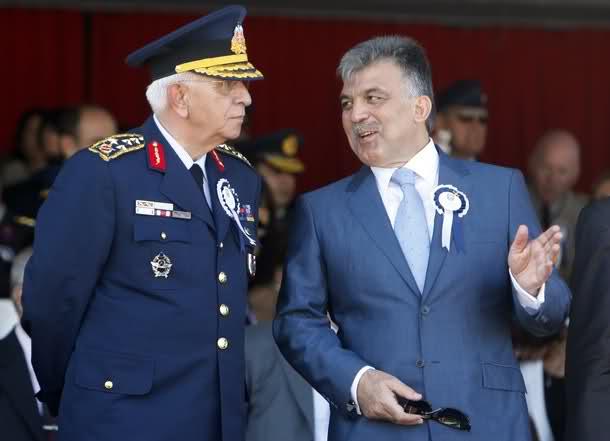
Many Arabs who initially praised the “Turkish model” have become disillusioned as they examine the facts on the ground. The government of Recep Erdoðan has jailed dissidents, censored journalists, and accused members of the military of taking part in conspiracies. Gen. Isik Koþaner (left), the former Turkish chief of staff, here with Turkish president Abdullah Gül, recently resigned in protest over the arrest of more than forty of his fellow generals.
The Turkish model has now begun to look less attractive to potential audiences with the harshest criticism coming from Turkish journalists on Ankara’s abuse of freedoms and drift away from democracy. The latest wave of arrests of Turkish journalists at the end of 2011 moved Milliyet columnist Mehmet Tezkan to write: “In a political structure where the head of internal security forces … perceives writers as ‘pens for sale,’ not even a halfway democracy, let alone an advanced democracy, is possible.”[44] Aslı Aydıntaşbaş commented that the political dynamic was developing in a direction that was totally opposite to what the AKP had promised “with the object of subduing the 50 percent of the population who did not vote for the AKP, instead of satisfying the other 50 percent’s demand for democratic change.”[45] Mehmet Ali Birand cautioned that arresting journalists, thinkers, and political staff because they were sympathizers of the Kurdish Workers’ Party (PKK) was “nothing more than forcefully silencing millions of people”[46] while Semih Idiz complained that the arrests were legal “witch hunts” against anyone considered disagreeable from an AKP perspective.[47] Taha Akyol warned against damaging the credibility of the judicial process in Turkey, maintaining that there have been “excessive arrests” which cast a shadow over the rightful nature of the court cases and undermined their credibility.[48]
It is indeed ironic that at the very time that Turkey sought to cast itself as a model of democratization, its own democracy was tottering with ninety journalists[49] and thousands of Kurdish activists or supporters under arrest or in prison.[50] Writing in the Milliyet, journalist Sami Kohen accused the West of indifference toward the negative developments in Turkey, maintaining that what was taking place was “casting a shadow over the ‘Turkish model’ for the Middle East.”[51] For her part, blogger Yesim Erez maintained that
during the last year, Western governments and mass media have urged new, post-revolutionary Arab governments to follow the “Turkish model” as a way of achieving a moderate democracy. The problem with this approach is that the Turkish model is not so moderate, democratic, or admirable.[52]
For all of Ankara’s efforts to extol the virtues of and to export its brand of democracy, the Turkish model does not seem to have made much headway in the Middle East. Arab elites remain reserved and suspicious because they fear Turkish ambitions in the region; emerging Islamist parties are wary because Turkey is too secular and too Western despite its AKP government; liberals are skeptical about Turkish democracy, and Arab states are searching for their own authentic, homegrown models to take into account the specific characteristics of each country.
Conclusions
Neither the Iraqi nor Turkish models have proven attractive to the Arab regimes emerging from the most recent unrest. The Iraqi model seems more frightening than encouraging, in part because it is perceived as a foreign imposition and in part because of the civil strife that was unleashed on its heels. Sunni-majority Arab states seem disinclined to embrace a model that empowers new forces such as Shiites or Kurds, especially when they have their own minorities — Copts, Berbers, or Shiites, among others — with which to contend.
For all the admiration that it had initially aroused, the Turkish model appears as unappealing as the Iraqi but for different reasons. Despite the fact that Turkey is a Muslim country, there are lingering fears and suspicions among the new regimes regarding Ankara’s real motives. The export of the Turkish model has been perceived as another vehicle for expanding Ankara’s neo-Ottoman ambitions in the region. To some, Ankara’s behavior seems arrogant as if it were lecturing the uncultured Arabs who need to be schooled by the “superior” Turks. From this perspective, there is little difference between a Christian or Muslim outsider.
The overwhelming sense is that each country affected by the unrest is searching for its own model and is unwilling to emulate another even when it has proved successful. A democratic system cannot be instantly copied and installed in another place. It needs time, a strong economic basis, stability, and most importantly, the willingness of a large segment of the society to embrace democratic norms. As Daniel Pipes has written: “Democracy is a learned habit, not instinct. The infrastructure of a civil society — such as freedom of speech, freedom of movement, freedom of assembly, the rule of law, minority rights, and an independent judiciary — needs to be established before holding elections. Deep attitudinal changes must take place as well: a culture of restraint, a commonality of values, a respect for differences of view and a sense of civic responsibility.”[53]
As of now, it seems highly doubtful that either Iraq or Turkey can help the post-revolutionary Arab regimes implement these conditions.
Ofra Bengio is a senior research fellow at the Moshe Dayan Center for Middle Eastern and African Studies at Tel Aviv University. She is author of “The Turkish-Israeli Relationship: Changing Ties of Middle Eastern Outsiders” (Palgrave, 2004) and “The Kurds of Iraq: Building a State within a State” (Lynne Rienner Publishers, 2012).
![]()
Notes:
[1] C. A. Hooper, The Constitutional Law of Iraq (Baghdad: Mackenzie and Mackenzie, 1928), p. 15.
[2] Abd al-Razzaq al-Hasani, Ta’rikh al-‘Iraq as–Siyasi al-Hadith, vol. 3 (Sidon: Matba’at al-‘Urfan, 1957), p. 235.
[3] “Iraq Liberation Act of 1998,” 105th U.S. Congress (1997-98), H.R.4655.ENR, Jan. 27, 1998.
[4] The Washington Post, Feb. 22, 2003.
[5] George Bush, speech to the American Enterprise Institute, Washington, D.C., in The Guardian (London), Feb. 27, 2003.
[6] “Iraq Overview: Governance,” World Directory of Minority and Indigenous Rights, Minority Rights Group International, London, accessed Mar. 7, 2012.
[7] The Wall Street Journal, Apr. 12, 2004.
[8] For voices critical of this constitution, see Andrew Arato, Constitution Making under Occupation: The Politics of Imposed Revolution in Iraq (New York: Columbia University Press, 2009), pp. 205-49.
[9] “Nuri Kamal al-Maliki,” The New York Times, Dec. 29, 2011.
[10] See, for example, Judith Colp, “Women in the New Iraq,” MERIA Journal, Sept. 3, 2008.
[11] Noga Efrat, “Women under the monarchy: A backdrop for post-Saddam events,” in Amatzia Baram, Achim Rohde, and Ronen Zeidel, eds., Iraq between Occupations: Perspectives from 1920 to the Present (New York: Palgrave Macmillan, 2010), pp. 121-3.
[12] John Eibner, “The Plight of Christians in Iraq,” field trip report, Christian Solidarity International, Westlake Village, Calif., Nov. 3-11, 2007.
[14] Condoleezza Rice, No Higher Honor: A Memoir of My Years in Washington (New York: Crown, 2011); USA Today, Oct. 31, 2011.
[15] The Washington Post, Aug. 31, 2011.
[16] Fouad Ajami, “Perspective: Five Myths about the Arab Spring,” St. Augustine (Fla.) Record, Jan. 15, 2012.
[17] National Public Radio, Dec. 21, 2011.
[18] Bernard Lewis, “Why Turkey Is the Only Muslim Democracy,” Middle East Quarterly, Mar. 1994, pp. 41-9.
[19] Sinan Ülgen, “From Aspiration to Inspiration: Turkey in the New Middle East,” Carnegie Papers, Carnegie Endowment for International Peace, Washington, D.C., Dec. 2011, p. 1.
[20] Taha Özhan, “The Arab Spring and Turkey: The Camp David Order vs. the New Middle East,” Insight Turkey, no. 4, 2011, p. 55.
[21] Ülgen, “Turkey in the New Middle East,” p. 1.
[22] Özhan, “The Arab Spring and Turkey,” p. 63; The Asia Times (Hong Kong), Sept. 11, 2011.
[23] Özhan, “The Arab Spring and Turkey,” p. 59.
[24] Nuh Yilmaz and Kadir Üstün, “The Erdoğan Effect: Turkey, Egypt and the Future of the Middle East,” The Cairo Review of Global Affairs, Fall 2011.
[25] Al-Ahram (Cairo), Sept. 14, 2011.
[26] Özhan, “The Arab Spring and Turkey,” p. 61.
[27] The Christian Science Monitor, Sept. 16, 2011.
[29] Özhan, “The Arab Spring and Turkey,” p. 59.
[30] Agence France-Presse, Dec. 2, 2011.
[31] See, for example, Ibrahim al-Amin, “Islamists in North Africa and the Turkish Model,” Alakhbar (Cairo), Oct. 24, 2011.
[32] Sadik J. al-Azm, “The ‘Turkish Model’: A View from Damascus,” Turkish Studies, Dec. 2011, pp. 638-40.
[33] Meliha Benli Altunışık, “Turkey: Arab Perspectives,” Foreign Policy Analysis Series, no. 11, p. 12.
[34] The Palestine Telegraph (Gaza), Sept. 20, 2011.
[35] Altunışık, “Turkey: Arab Perspectives,” p. 10.
[36] Alper Y. Dede, “The Arab Uprisings: Debating ‘The Turkish Model,'” Insight Turkey, Apr.-June 2011, p. 28.
[37] The Samosa (U.K.), June 6, 2011.
[38] Al-Ahram (Cairo), Sept. 22-28, 2011.
[39] Hassan Abou Taleb, “Following the Turkish Model or Forging Our Own?” al-Ahram, Sept. 19, 2011.
[40] Al-Arabiya News Channel (Dubai), Sept. 14, 2011.
[41] The Daily Star (Beirut), Jan. 17, 2012.
[42] Gulf Times (Doha), Jan. 17, 2012; The Doha Debates, at Bogazici University, Istanbul, Qatar Foundation for Education, Science and Community Development, Jan. 12, 2012.
[43] National Public Radio, Jan. 6, 2012.
[44] Milliyet (Istanbul), Jan. 12, 2011, in Mideast Mirror, Jan. 12, 2012.
[45] Ibid.
[46] Hürriyet (Istanbul), Jan. 24, 2012.
[47] Ibid.
[48] Ibid., Jan. 12, 2011, in Mideast Mirror, Jan. 12, 2012.
[49] Mehmet Ali Birand, Posta (Istanbul), Jan. 11, 2012, in Mideast Mirror, Jan. 11, 2012.
[50] Yeni Özgür Politika (Frankfurt), Jan. 8, 2012.
[51] Milliyet, Jan. 10, 2012, in Mideast Mirror, Jan. 13, 2012.
[52] Yesim Erez, “The ‘Turkish Model’ of Democracy: Neither Moderate nor Democratic,” PJ Media, Feb. 1, 2012.
[53] Daniel Pipes, “A Strongman for Iraq?” The New York Post, Apr. 28, 2003.



 RSS
RSS

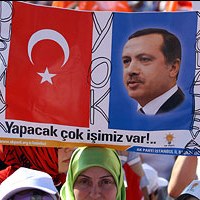
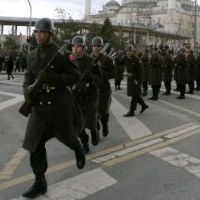
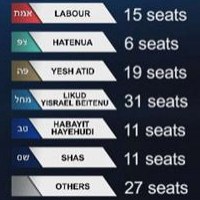
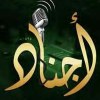
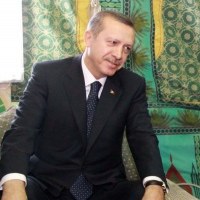




Latest Comments
Hello Mike, Thank you for your positive feedback to the article. I felt there wasn’t too much critical analysis of ...
Thanks for this considered and well constructed article. A follow up article on the manner in which the editorial contro...
THE CLUELESSNESS OF CLAIMING THAT OBAMA'S MIDDLE EAST POLICIES WERE A FAILURE CANNOT BE FURTHER FROM THE TRUTH, WHAT THE...
As long as Obama is the president of the usa do not trust the us government......
Thank you for an good read....